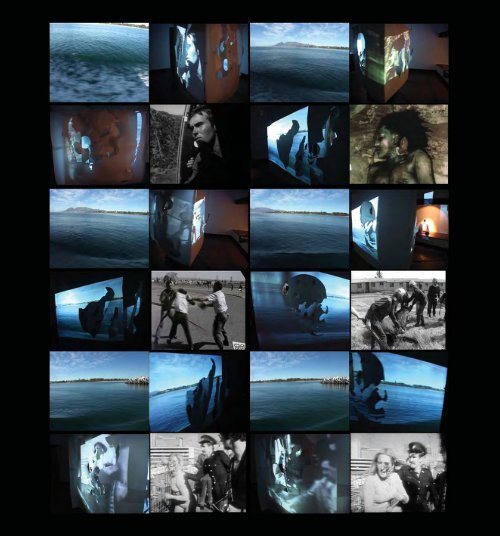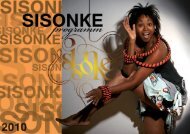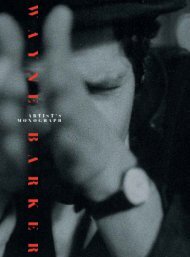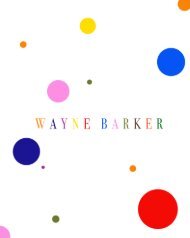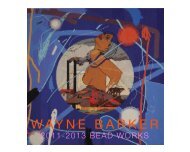SUPER BORING - Wayne Barker
celebrating 25 years of Wayne Barker’s work (catalogue), 2010, Marelize van Zyl (ed). Published by SMAC Gallery, Stellenbosch (RSA); ISBN: 978-0-620-46718-6
celebrating 25 years of Wayne Barker’s work (catalogue), 2010,
Marelize van Zyl (ed). Published by SMAC Gallery, Stellenbosch (RSA);
ISBN: 978-0-620-46718-6
You also want an ePaper? Increase the reach of your titles
YUMPU automatically turns print PDFs into web optimized ePapers that Google loves.
28<br />
WAYNE BARKER<br />
<strong>Wayne</strong> Cahill <strong>Barker</strong> was born in 1963 in<br />
Valhalla, south of Pretoria, a suburb populated<br />
by military families and employees<br />
of parastatals. The men in his family had<br />
strong ties to the South African Airforce<br />
and his father only made a sideways step<br />
when he later joined the governmentowned<br />
South African Airways. <strong>Barker</strong><br />
grew up in an environment in which the<br />
apartheid Defence Force was admired<br />
and even idolised. As he innocently spent<br />
his formative years there, Valhalla was a<br />
base for military actions against Angola,<br />
Mozambique and its own black population<br />
in the townships. 1<br />
In 1976, when he was in Standard six, <strong>Barker</strong> was<br />
arrested for buying dagga. That was also the year that<br />
other school children would be arrested – and killed – for<br />
defying apartheid education. Forced to leave his school,<br />
he absconded to Nature’s Valley, in search of freedom,<br />
becoming a woodcarver’s apprentice. Eight months later<br />
he came home to Pretoria and made contact with his<br />
parents once more. 2 <strong>Wayne</strong> <strong>Barker</strong> the rebel, the reprobate<br />
and the anti-authoritarian was fully formed and a sense of<br />
alienation (from society and his family) had begun to form<br />
that would infl uence his work forever afterwards.<br />
More than this however was a growing realisation that<br />
things were somehow not right around him. Even before<br />
his teens, he had witnessed brutality and oppression<br />
against those who had a different skin colour to him<br />
and had realised that the fact that white and black were<br />
treated differently and kept apart was not only abnormal:<br />
it was unjust. This, and his articulation of his opinions, far<br />
more than any ‘rebellious’ bad boy misdemeanours would<br />
1 Blignaut, Charl, in Atkinson, Brenda (ed.), <strong>Wayne</strong><br />
<strong>Barker</strong>: Artist’s Monograph. [S.l.]: Chalkham Hill Press &<br />
the French Institute of South Africa, 2000, p. 9.<br />
2 Blignaut, op. cit., p. 13.<br />
gradually cause an insurmountable rift between him and<br />
his father.<br />
After fi nishing his schooling at Capital College he<br />
spent a year at Pretoria Tech as an art student, gulping<br />
up information from art history books as eagerly as he<br />
tooled himself with practical skills. 3 After one year under<br />
the watchful eye of his parents he fl ed to the Michaelis<br />
School of Fine Art at UCT, where his cousin, Brett Murray,<br />
was already enrolled. He spent two tumultuous years there<br />
simultaneously impressing and outraging his lecturers<br />
with his commitment to painting and his ever-growing<br />
resistance to authority. It was to be his diffi culties with<br />
his beloved art history that was to prove his undoing at<br />
that institution. After bad marks in that subject, his father<br />
decided to withdraw him from his studies. It was time to<br />
go to war. He had different ideas, however, and spent<br />
two weeks feigning insanity once called up to do basic<br />
training in the army. Declared mentally unfi t he was soon<br />
discharged from National Service, a relief for <strong>Barker</strong> but the<br />
fi nal straw as far as his family was concerned. Disgraced<br />
in their eyes and not welcome to stay in their home, he<br />
turned to the big city, leaving for Johannesburg. It was the<br />
birth of <strong>Wayne</strong> <strong>Barker</strong> the independent artist.<br />
3 Ibid.<br />
<strong>SUPER</strong> <strong>BORING</strong><br />
29


